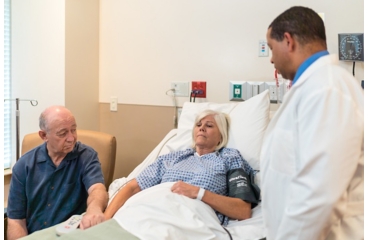
Overview
Sepsis is a serious reaction to an infection. It causes inflammation across large areas of the body and can damage tissue and organs. It can lead to extremely low blood pressure. Infections that can lead to sepsis include:
- A skin infection such as from a cut.
- A lung infection like pneumonia.
- A urinary tract infection.
- A gut infection such as E. coli.
Sepsis is treated with antibiotics. Your doctor will try to find the infection that led to sepsis. You'll also get fluids through a vein (I.V.). Machines will track your vital signs, including temperature, blood pressure, breathing rate, and pulse rate.
The physical and mental effects of sepsis may not be seen for several weeks after treatment. And they may last long after the infection is gone.
Physical problems may include:
- Feeling weak and tired.
- Feeling out of breath.
- Aches and pains.
- Problems with getting around.
- Trouble falling asleep or staying asleep.
- Dry and itchy skin, brittle nails, and hair loss.
Some of these effects can lead to problems with your organs or your feet, legs, hands, or arms.
Sepsis can also affect your mind and emotions. Problems may include:
- Self-doubt.
- Anxiety.
- Nightmares.
- Depression and mood problems.
- Wanting to avoid other people.
- Confusion.
- Flashbacks and bad memories of your illness.
It's important to care for yourself and try to avoid infections. This may lower your risk of getting sepsis again.
Follow-up care is a key part of your treatment and safety. Be sure to make and go to all appointments, and call your doctor if you are having problems. It's also a good idea to know your test results and keep a list of the medicines you take.
How can you care for yourself at home?
- Be safe with medicines. Take your medicines exactly as prescribed. Call your doctor if you think you are having a problem with your medicine.
- If your doctor prescribed antibiotics, take them as directed. Do not stop taking them just because you feel better. You need to take the full course of antibiotics.
- Help prevent future infections.
- Avoid infections such as COVID-19, colds, and the flu. Wash your hands often. Stay up to date on your COVID-19 vaccines. And get a flu vaccine every year.
- Ask your doctor if you need a pneumococcal vaccine (to prevent pneumonia, meningitis, and other infections). If you have had one before, ask your doctor if you need another dose.
- Clean any wounds or scrapes.
- Drink plenty of fluids to prevent dehydration.
- Eat a healthy diet. Include fruits, vegetables, and whole grains in your diet every day.
- If your doctor recommends it, try doing some physical activity.
When should you call for help?
Call 911 anytime you think you may need emergency care. For example, call if:
- You passed out (lost consciousness).
Call your doctor now or seek immediate medical care if:
- You have symptoms such as:
- Shortness of breath.
- Feeling very sick.
- Severe pain.
- A fast heart rate.
- Cool, pale, or clammy skin.
- Feeling confused.
- Feeling very sleepy, or you are hard to wake up.
- You are dizzy or lightheaded, or you feel like you may faint.
- You have a fever or chills.
Watch closely for changes in your health, and be sure to contact your doctor if:
- You do not get better as expected.
Where can you learn more?
Go to http://www.healthwise.net/patientEd
Enter T383 in the search box to learn more about "Sepsis: Care Instructions".
Current as of: September 30, 2025
Author: Ignite Healthwise, LLC Staff
Clinical Review Board
All Ignite Healthwise, LLC education is reviewed by a team that includes physicians, nurses, advanced practitioners, registered dieticians, and other healthcare professionals.

